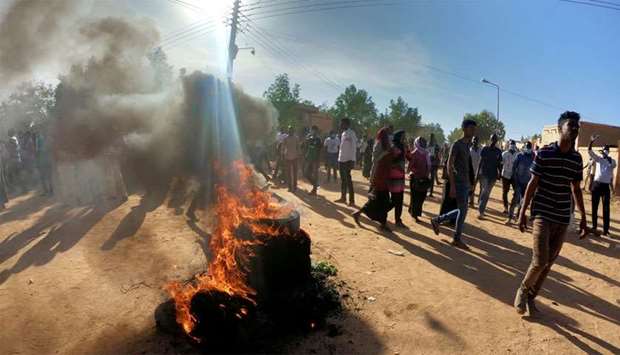Crowds of Sudanese protesters on Sunday held rallies in their neighbourhoods and some squares in the capital and its twin city of Omdurman after organisers called for more anti-government demonstrations.
Protests sparked by a government decision to raise the price of bread have rocked the east African country for weeks.
The demonstrations have mushroomed into nationwide rallies against the government of President Omar al-Bashir, who swept to power in 1989 in a religion-backed coup.
Officials say 30 people have died in the violence since the protests first erupted on December 19 in the farming town of Atbara before spreading to Khartoum and other regions.
Rights groups say more than 40 people have been killed.
On Sunday, protesters came onto the streets in Khartoum and Omdurman to hold sit-ins in several squares, responding to a call by the Sudanese Professionals Association which is leading the protest campaign.
But a massive deployment of riot police and security agents prevented them from gathering at several locations, witnesses said, after which the protesters began rallies in three residential areas of Khartoum and two in Omdurman, across the Nile.
‘You're police, you have to protect us,’ shouted the demonstrators as riot police cordoned off several squares in Khartoum and Omdurman where protesters had planned to gather for sit-ins.
Police surrounded many district squares and also filled some with muddy water to prevent demonstrators from gathering, witnesses said.
The Sudanese Professionals Association had also called for night-time demonstrations on Saturday, but there were no major rallies held during the night.
The group, an umbrella association of doctors, engineers and teachers, has also called for simultaneous rallies across the country until Wednesday.
Authorities led by the country's National Intelligence and Security Service (NISS) have cracked down on protesters, opposition leaders, activists and journalists in a bid to prevent the spread of demonstrations.
Bashir, who on Sunday visited Egypt to meet President Abdel Fattah al-Sisi, has remained steadfast in rejecting calls to resign.
He has blamed the deadly violence on ‘infiltrators’ among the protesters, whose main slogan is ‘freedom, peace, justice’.
While the spark for the first protests was the rise of bread prices, anger has been mounting for years over worsening economic hardship and deteriorating living conditions.

